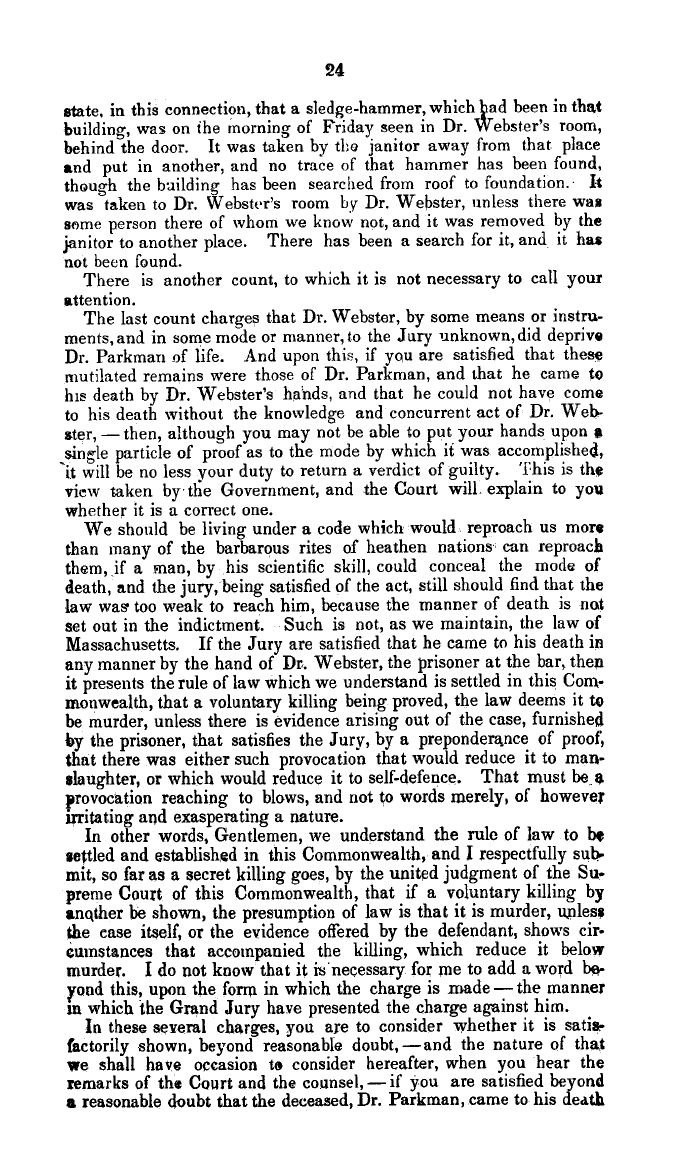|
24
state, in this connection, that a sledge-hammer, which bad been in that
building, was on the morning of Friday seen in Dr. Webster's room,
behind the door. It was taken by the janitor away from that. place
and put in another, and no trace of that hammer has been found,
though the building has been searched from roof to foundation. It
was taken to Dr. Webster's room by Dr. Webster, unless there was
some person there of whom we know not, and it was removed by the
janitor to another place. There has been a search for it, arid it has
not been found.
There is another count, to which it is not necessary to call your
attention.
The last count charges that Dr. Webster, by some means or instru-
ments, and in some mode or manner, to the Jury unknown, did deprive
Dr. Parkman -of life. And upon this, if you are satisfied that these
mutilated remains were those of Dr. Parkman, and that he came to
his death by Dr. Webster's hands, and that he could not have come
to his death without the knowledge and concurrent act of Dr. Web-
ster, -then, although you may not be able to put your hands upon
single particle of proof as to the mode by which it was accomplished,
it will be no less your duty to return a verdict of guilty. This is the
view taken by the Government, and the Court will. explain to you
whether it is a correct one.
We should be living under a code which would reproach us more
than many of the barbarous rites of heathen nations can reproach
them, if a man, by his scientific skill, could conceal the mode of
death, and the jury, being satisfied of the act, still should find that the
law was too weak to reach him, because the manner of death is not
set out in the indictment. Such is not, as we maintain, the law of
Massachusetts. If the Jury are satisfied that he came to his death in
any manner by the hand of Dr. Webster, the prisoner at the bar, then
it presents the rule of law which we understand is settled in this Com-
monwealth, that a voluntary killing being proved, the law deems it to
be murder, unless there is evidence arising out of the case, furnished
by the prisoner, that satisfies the Jury, by a preponderance of proof,
that there was either such provocation that would reduce it to marn-
slaughter, or which would reduce it to self-defence. That must be,oL
provocation reaching to blows, and not to words merely, of however
irritating arid exasperating a nature.
In other words, Gentlemen, we understand the rule of law to be
settled and established in this Commonwealth, and I respectfully sub
mit, so far as a secret killing goes, by the united judgment of the Su.
preme Court of this Commonwealth, that if a voluntary killing by
anqther be shown, the presumption of law is that it is murder, upless
the case itself, or the evidence offered by the defendant, shows cir-
cumstances that accompanied the killing, which reduce it below
murder. I do not know that it is necessary for me to add a word be-
yond this, upon the forru in which the charge is made-the manner
to which the Grand Jury have presented the charge against him.
In these several charges, you are to consider whether it is satis-
factorily shown, beyond reasonable doubt,-and the nature of that
we shall have occasion to consider hereafter, when you hear the
remarks of the Court and the counsel, - if you are satisfied beyond
a reasonable doubt that the deceased, Dr. Parkman, came to his death
|

